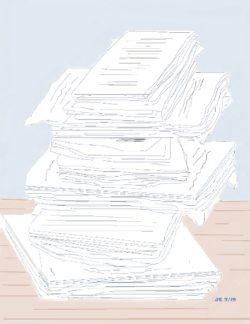
I’ve been practicing yoga for about eight years now and, at 53, have settled into the awareness that some days I can do all the poses to some degree, while on other days, my shoulder won’t allow full extension or a cramp in my foot will pull me out of a stretch. One day my balance may be outstanding, while on another day I’m a live Weeble (old commercial for the round-bottomed figures: “Weebles wobble but they won’t fall down”). And yet with regularity I hear envious or timid comments from newbies regarding old-timers in the class: “Oh, look at her, she’s so flexible, must be nice to do that” or “I’ve heard R— is a really tough teacher. I’m not up for that.”
Yoga is a personal practice. Yes, it’s good to have role models and get direction to be sure you don’t hurt yourself, but no one starts out as an expert. Few can do all the moves with ease; we all have limitations.
There is a woman in one of my classes who is 89. She doesn’t have full extensions. She modifies poses. But she shows up and goes through the entire practice without stopping. She’s an inspiration.
As a fairly new serious writer, I’ve seen bits of advice about the writing process that I have pondered and rejected: You must have discipline. Set aside a time each day to write. You must write every day and consistently if you want to be a serious writer, otherwise you are just a hobbyist.
Nice work if you can get it. I know people who can do that, and that’s great. I’ll mention gently that they tend to be men who don’t have to fret about laundry, pet care, meal-planning etc. But okay, yes, discipline. I could set the alarm for an hour and a half earlier, get my coffee and hope to turn on the computer and be creative without disrupting the household.

But hold up a sec. I don’t think 100% of the writing takes place at the keyboard. When I’m starting out with the seed of a new story, I have to let it percolate awhile. Sure, some stories come gushing out, and my job is to transcribe them much as I imagine Coleridge frantically scribbled “Kubla Khan,” the poem that came to him in a dream.
But others take a bit of time to form. I’m currently letting a story percolate that was inspired by a photograph of a teapot. Where will my story take place? Who will be telling the story? Do I know where the story will go? I’m thinking about this while loading the dishwasher, walking the dog, and taking a bath. I think I’ll set it in Tennessee, and it will begin with a trip to a remote pottery shop. I need a catchy name for the pottery shop, the road that it’s on, and perhaps the microtown it’s in. This calls for research. I need to study a map.
If someone asks me, “Do you write every day?” my answer is, “Not exactly.” Some days I’m doing research. Some days I’m creating illustrations for a story. I’m not a terrific artist, but my designs help me with the story process, and I hope they’re fun perks for readers. I’m thinking about the story while I’m selecting colors and shading. And then some days I’m just asking and answering questions. Is she a girlie-girl or kind of earthy/Wiccan? And why does she stop at the pottery shop instead of heading into town? If she’s a girlie-girl, she needs a girlie-girl name. Nope, I think she’s earthy/Wiccan; that’s why she likes pottery. Sarah? Gwendolyn? Leslie? Lilah? Magdalena? Ariel? Hmm.
None of this process takes place while I’m staring at a screen. Once I have the answers, the name, the story and a general idea of where the story is going, I’ll sit down. Gwendolyn wiped a tear from her eye as she backed her [Oh dear, what kind of car does she drive? If this takes place in the ’70s, she needs to be driving her parents’ old Volvo] two-tone, cream/dirt-colored Volvo out of the dormitory parking lot.

I used to feel guilty that I don’t set an alarm and confine myself to the desk for a certain period of time, but I’m just not that disciplined, plus my Basset hounds won’t allow it. I do dedicate time each day to some aspect of writing: editing, making notes, working on a design or just thinking.
Some writers can crank out pages a day. Some are satisfied with a perfect paragraph. But it’s like yoga—you can only do what you can do when you can do it. Looking around the room to see what others are doing is fine for reference, but don’t get mired in self-flagellating comparisons. Some days you might write pages. Other days it might be reworking that first sentence again. It just is. Don’t compare. Just do what you can today.

Connie Morrison
This is excellent advice, Jess, and will take care of that guilt trip that seeps into the brain when we know we should be writing but….. Thanks for sharing your very interesting process.
Barbara Bockman
Thanks, Jess. My process is much like yours, although less disciplined.
Patsy Murray
Good advice, Jess. Also works for fiddle practice!
Mary Bast
OK, but I think I’m going to compare myself to you! Just kidding… kind of. Thanks for a great read and the reminder of real life.
Joan Carter
A fun post, Jess. I’ll bet many stories are written that way. Maybe the percolation happens overnight, so the writer is ready to sit down in the morning and type.
Art Crummer
Well expressed, Jess. Most of the best elements of my writing have emerged while mopping the floor, repairing the roof, shoveling compost around garden plants at times when I didn’t even realize I was working/dreaming about the current story, or one yet to emerge. However, I will have to confess:
I have occasionally experienced, during yoga, an insight into one of my characters, where is structure element of a story, when I thought I had emptied my mind, if only fleetingly. Thank you for this thoughtful and accurate essay.